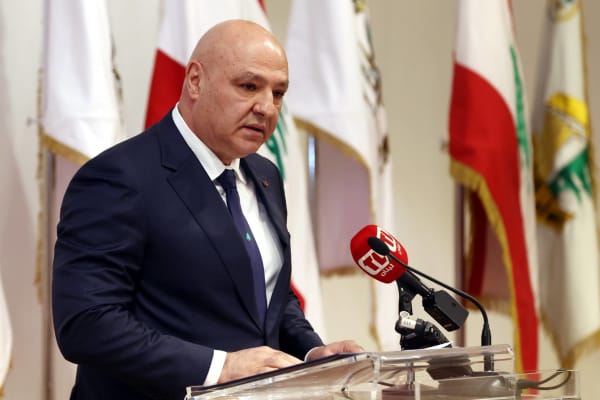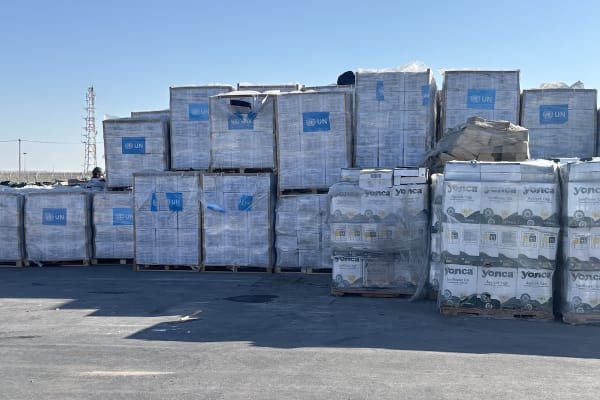Lebanese President Joseph Aoun attends the commemoration of the army martyrs in Yarzeh, Beirut, Lebanon, on July 31, 2025. Photo by Lebanese Presidency Office via Reuters
Under pressure from the United States, the Lebanese state has been sharpening its tone toward Hezbollah leadership, stressing that cooperation with a process of disarmament is the only viable option for the terrorist group that remains the country’s most powerful armed force.
Lebanese President Joseph Aoun, who has vowed to adhere to U.S. demands and disarm Hezbollah through a negotiated process, reportedly warned the terror group that there would be no alternative to cooperation, ahead of a cabinet session set for Tuesday that could set a timeframe to implement the steps.
“Hezbollah is in a state of shock over its allies’ public calls for the monopolization of weapons,” Lebanese sources told the Saudi Al-Hadath channel, adding, “The final version of U.S. envoy Tom Barrack’s ideas was delivered to Lebanon today.”
Barrack – special envoy for Lebanon, as well as the American ambassador to Turkey – has presented Lebanon with a roadmap for reforming the country. One of the central points of the plan is to disarm Hezbollah.
On July 26, he wrote that “the credibility of Lebanon’s government rests on its ability to match principle with practice. As its leaders have said repeatedly, it is critical that ‘the state has a monopoly on arms.’ As long as Hezbollah retains arms, words will not suffice. The government and Hezbollah need to fully commit and act now in order to not consign the Lebanese people to the stumbling status quo.”
In recent days, Lebanese officials have ramped up their rhetoric as Hezbollah maintains that its weapons are essential for defending the country against Israel, while demanding that the IDF completely withdraw its troops from southern Lebanon as a precondition for laying down its weapons.
In response, Aoun has argued that failing to do so would give Israel the pretext it needs to continue its attacks on Lebanon.
“The speech of President Joseph Aoun and placing the arms issue on the cabinet’s agenda have created a popular and political momentum supportive of the state,” the Lebanese sources told the Saudi Al-Hadath channel.
However, despite its weakened status following Israel’s elimination of most of its leadership and weapons arsenal, Hezbollah is making moves to hamper the political process, recruiting its allied Shiite party, Amal, for support.
“Hezbollah and the Amal Movement have agreed to have a common stance on the session, which means to attend, not attend or boycott the government if needed,” sources told Al Jadeed TV.
“MP Mohammad Raad agreed with Speaker Nabih Berri to carry out contacts to contain the repercussions of Tuesday’s session, and he discussed its agenda with President Joseph Aoun in Baabda and it was agreed to work on avoiding any domestic deterioration,” they added.
According to Reuters, the U.S. proposal delivered in June would require Hezbollah to disarm within four months.
Aoun also stated that he would seek a $1 billion annual commitment over the next decade to support Lebanon’s security forces, along with a proposal for an international conference to back reconstruction efforts in a country long plagued by financial, political, and security crises.
In exchange, Lebanon demands the withdrawal of Israeli troops occupying five outposts in southern Lebanon, and a halt to Israeli air strikes on Hezbollah targets, which have continued despite the ceasefire.
Without explicitly naming Hezbollah, Aoun called on “those who have faced the aggression” to entrust their security “solely on the Lebanese state.”
“You are too honorable to risk the state-building project, and too noble to provide pretexts for an aggression that wants to continue the war against us,” he said.
For his part, Lebanese Prime Minister Nawaf Salam has said he is not afraid of the disarmament process, adding that a state monopoly on weapons was a Lebanese rather than a U.S. demand.
Hezbollah representatives have attempted to rally their supporters and sway public opinion. Last week, the group’s leader, Naim Qassem, said that disarming Hezbollah would only serve Israel.
Hezbollah lawmaker Ali Fayyad reiterated the terror group’s position that any process must begin with an Israeli commitment to withdraw from Lebanese territory, halt its strikes against Hezbollah, and release the remaining Lebanese prisoners.
“The Lebanese government will not be able to bypass these conditions, and this is reflected in the speech of the President of Lebanon. Therefore, no one must bypass these conditions and this starting point – this will be the first step.”
He threatened that failure to meet these conditions would endanger Lebanon’s “existence, its territory, its security, and its stability.”
Mahmoud Qamati, deputy chairman of Hezbollah’s Political Council, added another warning: “Whatever the government decides – I hope it will make a wise, balanced decision that preserves the ‘resistance’ and respects the ‘resistance.’ If not, then whatever that decision may be, it will be nothing more than ink on paper!”





